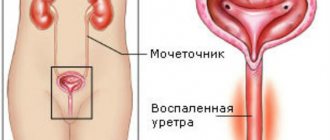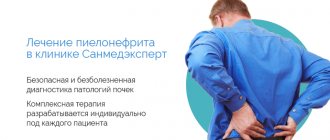Chronic pyelonephritis is an infectious-inflammatory process of a nonspecific nature that can develop in one or both kidneys and the upper urinary tract. In this case, damage occurs to the kidney parenchyma and pyelocaliceal system. Among kidney diseases, pyelonephritis is one of the most common.
As a rule, the cause of this pathology is bacterial. Basically, the infection enters the kidneys through the ureters from the bladder and urethra. Another way the inflammatory process occurs is the entry of microorganisms from the source of infection through the blood or lymph.
According to statistics, pyelonephritis is more typical for women, who suffer from this pathology 6 times more often than men. This is due, first of all, to the anatomical features of the structure of the urethra - in women it is shorter, therefore, the infection quickly enters the kidney tissue. In addition, women during pregnancy, as well as children under 7 years of age, are more susceptible to pyelonephritis. In men, this disease often develops against the background of prostate adenoma and chronic prostatitis, which is associated with obstructed urine outflow. In the presence of urolithiasis, representatives of both sexes are equally susceptible to the development of pyelonephritis.
Classification
Pyelonephritis is classified according to the nature of its course into:
- spicy
- chronic
Depending on the number of affected kidneys, pyelonephritis occurs:
- double-sided
- unilateral
Depending on how the infectious agent entered:
- ascending variant (more common)
- descending variant (less common)
Depending on the conditions under which the inflammatory process occurs:
- primary
- secondary
According to the patency of the urinary tract, pyelonephritis is distinguished:
- obstructive
- non-obstructive
Symptoms of pyelonephritis
Depending on the course of the disease, clinical manifestations may vary.
- In the acute form, the patient suddenly develops a fever and experiences pain in the lumbar region, which can radiate to the groin area and the anterior thigh.
- A headache and general weakness may appear, which is associated with the manifestation of intoxication.
- In addition, with acute pyelonephritis, swelling may occur, and there may also be an increase in blood pressure.
- In a general urine test, an increase in the level of leukocytes is observed, which is the first sign of the onset of an acute inflammatory process. Less common in urine analysis are red blood cells, protein, and casts.
- In a general blood test, inflammatory changes are recorded, in particular leukocytosis.
In chronic pyelonephritis, a combination of the following symptoms is observed, the severity of which depends on the severity of the disease:
- Pain syndrome. As a rule, it is characteristic of the phase of active inflammation, while during latent inflammation it may be completely absent. Moderate pain is localized in the lumbar region, as well as in the lateral flanks of the abdomen. Usually, with primary pyelonephritis, pain is observed on both sides, with secondary pyelonephritis - one-sided. The pain does not depend on body position. There may be a symptom of rocking in the lumbar region (pain).
- Often an analogue of pain can be a feeling of chilliness in the lumbar region.
- Intoxication syndrome. Manifested by weakness and chills while maintaining normal body temperature. There may be fever in the evening. A significant increase in temperature is observed in only 20% of patients.
- Edema syndrome. As a rule, puffiness occurs in the morning in the face area.
- Arterial hypertension syndrome. Develops on average in 50-75% of patients, more often observed during exacerbations.
- Syndrome of disturbed rhythm of urine separation. Chronic pyelonephritis is characterized by nocturia (excretion of most of the daily volume of urine at night) and pollakiuria (frequent urination).
- Anemia, the occurrence of which is associated with inhibition of the production of erythropoietic factor in the kidneys due to the inflammatory process.
- Changes in general urine analysis are inconsistent and are expressed in low specific gravity of urine in the absence of exacerbation, bacteriuria and leukocyturia during exacerbation of the disease.
If such symptoms appear, it is recommended to undergo examination to exclude acute or chronic pyelonephritis!
For any severity of the disease, you must immediately consult a nephrologist for help, since chronic pyelonephritis, especially in the presence of frequent complications and the absence of anti-relapse treatment, can lead to numerous complications, among which the main ones are the following:
- arterial hypertension of renal origin
- chronic renal failure.
Stages
In chronic pyelonephritis, there are three stages of disease progression:
- the initial degree is characterized by the development of inflammation, swelling of the connective tissues of the inner layer of the urinary organ, as a result of which the vessels are compressed, tubular atrophy appears, and renal bleeding decreases;
- the second degree is detected through a nephrogram, where diffuse narrowing of the arterial renal bed is noted, the size of the cortex becomes smaller, interlobar arteries are absent;
- the third degree of pyelonephritis is expressed by a narrowing and change in the shape of all vessels of the urinary organ, the kidney tissue is replaced by scar tissue, the kidney becomes wrinkled.
Diagnostics
The EXPERT Clinic has developed a clear algorithm for diagnosing chronic pyelonephritis. The required comprehensive examination includes:
Laboratory methods
- general urine analysis to detect signs of inflammation (bacteria, leukocytes)
- When bacteria are detected in a general urine test, urine is cultured to determine the flora and its sensitivity to antibiotics
- Clinical and biochemical blood tests are performed.
You can start your examination by conducting a comprehensive screening for pyelonephritis.
Instrumental studies
Ultrasound of the kidneys, during which ultrasound signs of changes in the structure of the kidneys are assessed.
Important! The scope of the necessary examination can only be determined by a nephrologist.
Treatment of pyelonephritis
Considering the incidence of pyelonephritis and the high likelihood of complications, the approach to treatment should be carried out exclusively at a professional level. Self-medication is fraught with an increased risk of complications, and in the acute form – transition to chronic.
When choosing a treatment regimen, our doctors are guided not only by the basic principles of treatment of pyelonephritis, but also take into account a number of other factors: the presence of concomitant diseases, the state of the immune system, and the patient’s age.
In acute pyelonephritis, the choice of treatment tactics will depend on the nature of the inflammatory process, the form of the disease, as well as on the individual characteristics of the course. The general approach to treatment is based on the selection of:
- diets
- regime
- hydration
- detoxification therapy
- antibacterial medicines
Antibacterial therapy is the main means of quickly relieving the symptoms of acute pyelonephritis. It is combined with drugs that have a detoxification effect, antihistamines, as well as those that help activate the body's defense reactions. In order to increase the effectiveness of complex therapy for acute pyelonephritis, hyperbaric oxygenation can also be prescribed.
In chronic pyelonephritis, the approach to treatment is determined by factors such as the duration of the disease, the frequency and duration of exacerbations. During the period of exacerbation, a bed regimen is recommended, and in the absence of exacerbation - the usual one, excluding severe physical activity and professional sports. Dietary nutrition should be followed by all patients suffering from chronic pyelonephritis, but during exacerbations it should be monitored more strictly and in accordance with the doctor’s recommendations. In the case of a complication such as renal arterial hypertension, salt intake should be minimized and water loads reduced during the period of severity of the edema syndrome.
Drug treatment of acute pyelonephritis is aimed at eliminating the infectious cause of the disease. Another group of drugs that are recommended for the treatment of chronic pyelonephritis are drugs that improve microcirculation in the renal tissue and reduce capillary permeability. Adaptogens, multivitamins, and herbal medicines with a uroseptic effect are used as auxiliary agents necessary for anti-relapse treatment.
The EXPERT Clinic adheres to the principle of stages in treatment.
At the first stage, a treatment plan is drawn up, which includes:
- mode
- diet
- selection of basic therapy with antibacterial drugs in combination with herbal uroseptics.
At the second stage, the effectiveness of the therapy is assessed:
- If, with the use of antibacterial drugs, the activity of the disease decreases and the clinical symptoms become less pronounced, then the regimen and diet are expanded, a preventive course of treatment is prescribed, and a date is set for a return visit to the doctor.
- If there is no improvement in well-being during the therapy, the issue of prescribing stronger antibacterial drugs is decided.
The third stage of treatment is carried out after achieving stable remission. It represents a course of preventive treatment.
Even after achieving long-term remission, the patient is advised to be attentive to himself and regularly see a nephrologist, as a relapse of the disease is possible.
Almost all patients need to take anti-relapse therapy recommended by their doctor. Some medications help reduce the risk of exacerbations and chronic renal failure.
Forecast
If diagnosis and treatment of acute pyelonephritis begins on time, immediately after the onset of the first symptoms of the disease, then in most cases it allows for complete recovery. As a rule, this outcome is observed in 90% of clinical cases. With the development of acute purulent pyelonephritis, a favorable prognosis is ensured with timely surgical intervention. In the case when purulent pyelonephritis is complicated by urosepsis or bacteriotoxic shock, which happens in 20% of cases, the prognosis, unfortunately, is unfavorable.
In chronic pyelonephritis, the prognosis is determined by factors such as the duration of the disease and the activity of the inflammatory process. An unfavorable prognosis occurs in cases where the patient's condition is complicated by arterial hypertension of renal origin and chronic renal failure.
Remember that it is very important to start treatment in the early stages of the disease, since advanced cases usually require long-term, difficult and expensive therapy.
Why does an acute process become chronic?
The causes of chronic pyelonephritis can be considered:
- poor-quality treatment of acute pyelonephritis, failure of the patient to comply with the doctor’s clinical recommendations, failure to monitor a child or adult;
- untimely diagnosis and treatment of diseases that impair the outflow of urine (urolithiasis, nephroptosis, vesicoureteral reflux, congenital anomalies of narrowing of the urinary tract, prostate adenoma);
- the presence of concomitant chronic diseases that undermine the body’s immunity or are constant foci of infection (obesity, diabetes, sinusitis, tonsillitis, diseases of the gallbladder, intestines, pancreas);
- the ability of some pathogens to form L-forms, which can remain in the kidney tissue for a long time in an inactive state, but cause an exacerbation when the defenses are reduced or in immunodeficiency states.
There is no standard risk group for chronic pyelonephritis, but practitioners believe that the infection is most dangerous for:
- pregnant women;
- children under three years of age, mostly bottle-fed;
- girls during the onset of sexual activity;
- elderly people.
Prevention of chronic pyelonephritis is most indicated for these patients.
Recommendations and prevention
Patients with pyelonephritis are advised to follow a diet. The diet is selected in such a way that the nutrition is energetically valuable due to carbohydrates and fats of plant origin. The source of protein for such patients is chicken egg whites, boiled fish and lean meat. Spicy seasonings are absolutely contraindicated. It is also necessary to reduce salt intake and increase fluid intake to improve the effectiveness of detoxification therapy.
To prevent the development of the disease, it is necessary to eliminate the causes leading to the formation of inflammation and disruption of the normal functioning of the urinary tract (timely treatment of urinary tract infections, regular urination, training in proper toileting of the external genitalia in girls, etc.).
In order to prevent relapses, all patients are recommended to consult a nephrologist once a quarter to assess kidney function and develop or correct anti-relapse treatment. To prevent relapses, methods of restoring normal urination and antibacterial treatment are used.
Patients suffering from pyelonephritis are recommended to visit the sanatorium at least once a year, as well as undergo routine treatment in a hospital setting.
Diet and nutrition rules
The chronic course of the disease requires serious attention to diet. Recommended:
- cereals, dairy products and vegetarian dishes;
- watermelons, melons and pumpkin dishes;
- increase fluid intake to 2.5 liters;
- include a small amount of meat or fish broth in the diet;
- Boil fish and meat of non-fatty varieties, or cook only by steaming;
- fresh and boiled vegetables and fruits;
- Horseradish, garlic and radish should be excluded from the diet;
- Limit salt intake per day to 8 grams.
A balanced diet promotes rapid recovery. When the disease worsens, the diet should include fresh fruits and vegetables, as well as at least 2 liters of liquid. Fried, spicy, fatty and salty foods are not allowed in the diet.
FAQ
Can chronic pyelonephritis be cured?
Chronic pyelonephritis is a chronic disease of an infectious nature. Thus, available medications are aimed at reducing the intensity of the inflammatory process, allowing for long-term and sometimes lifelong remission, but cannot completely cure the disease.
What causes the disease?
Pyelonephritis is based on a urinary tract infection and the formation of urodynamic disturbances (reflux of urine into the overlying parts of the urinary system). Women are more often affected, which is due to anatomical features. In old age, the disease is equally common in both women and men.
Is the disease a contraindication to pregnancy?
Pregnancy is permitted with stable remission for 2 years without a high degree of increase in blood pressure. During this period, regular monitoring of urine tests and the use of herbal uroseptics (cranberry, lingonberry) are necessary.
Frequent exacerbations, hypertension, and impaired renal function are indications for termination of pregnancy at any stage.
Can pyelonephritis cause pain when urinating?
The presence of cramps or pain when urinating is a manifestation of cystitis - inflammation of the bladder, which may be a causative factor for further ascending infection, but not a symptom of pyelonephritis.
Does the risk of developing pyelonephritis increase if a close relative suffers from this disease?
It is not pyelonephritis that is inherited, but the peculiarities of the anatomical structure of the urinary tract, which indirectly can further increase the risks of urodynamic disorders.
The basis of the disease is an infection that is not related to hereditary factors.
Causes
The cause of pyelonephritis is always an infection. Factors contributing to the development of an infectious process in the kidney:
- Disturbances in the outflow of urine (narrowing of the ureter, abnormalities in the development of the kidneys, hydronephrosis, reflux, tumor, stones, etc.);
- Pre-existing kidney disease, especially interstitial nephritis;
- Immunodeficiency conditions (treatment with cytostatics and/or prednisolone, diabetes mellitus, immune defects);
- Hormonal imbalance (pregnancy, menopause, long-term use of contraceptives).
Treatment stories
Story No. 1
Patient D., 26 years old, came to the EXPERT Clinic with complaints of thirst, frequent painless urination at night, fever up to 37 C. From the medical history it is known that since childhood, changes in urine tests were detected, treatment was carried out (which she does not remember) and To date I have not had any complaints. From the life history it is known that the patient had recently gotten married and the couple spent their honeymoon on a tourist trip in April, living in a tent. Notes the presence of hypothermia, as her feet were wet. During an objective examination, the doctor revealed a symptom of painful tapping in the lumbar region on both sides. Laboratory and instrumental examination revealed bacteria and leukocytes in a general urinalysis, and subsequent urine culture determined the microflora that caused exacerbation of pyelonephritis and sensitivity to antibiotics. Ultrasound of the kidneys established ultrasound criteria for chronic pyelonephritis. It was explained to the patient that the exacerbation of chronic pyelonephritis was caused by 2 important factors for the woman: changes in the microflora of the urogenital zone (the so-called “honeymoon” pyelonephritis) and hypothermia. Before obtaining the results of urine culture (the duration of its implementation is up to 8-10 days), the patient was prescribed antibacterial treatment with a broad-spectrum antibiotic in combination with herbal uroseptics. Recommendations were given on lifestyle (avoid hypothermia, sexual rest during treatment). After receiving the results of the sensitivity of microorganisms to antibiotics, treatment with the selected drug was continued, since the sensitivity of the isolated microorganism to it was confirmed. The patient successfully completed the course of treatment and continues to be observed at the EXPERT Clinic for 2 years. During the observation period, no relapses of the disease were observed. The family is planning the birth of their first child under the supervision of an obstetrician-gynecologist and nephrologist.
Story No. 2
Patient Sh., 58 years old, consulted a neurologist with complaints of discomfort in the lumbar region. When examined by a neurologist, no cause-and-effect relationship was found between the symptoms and the state of the peripheral nervous system. A careful history taking revealed that the patient had been experiencing difficulty urinating for several years. He was examined by a urologist 8 years ago, at which time the initial stage of prostate adenoma was identified with recommendations for dynamic monitoring, which the patient did not comply with. The neurologist held an absentee consultation with a urologist and nephrologist, as a result of which an examination was prescribed: clinical and biochemical blood tests, tumor markers of prostate pathology, general urine analysis and ultrasound of the kidneys and prostate with determination of residual urine. The examination revealed signs of inflammation of the urinary system (signs of pyelonephritis) and progression of prostate adenoma when compared with data from 8 years ago. It was explained to the patient that the exacerbation of pyelonephritis was caused by impaired outflow and stagnation of urine as a result of the growth of prostate adenoma. The man was prescribed antibacterial treatment in parallel with conservative therapy for prostate adenoma. Against the background of complex therapy, the inflammation was stopped, the patient continues treatment with a urologist with regular examinations and timely examination by a specialist.








